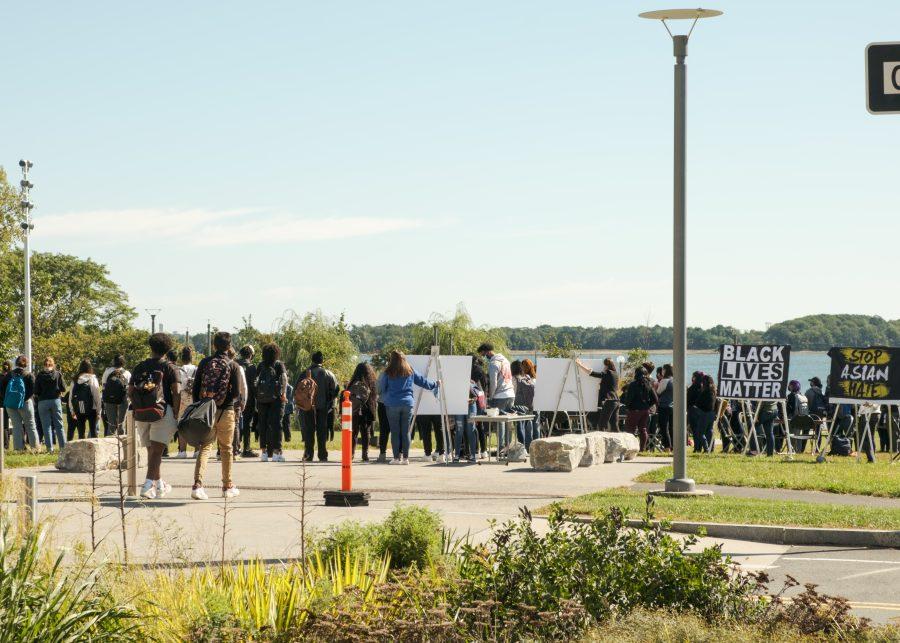On Friday, Oct. 1, the Black Student Center held a demonstration addressing recent acts of racism on campus, and the administration’s lack of response to them. The demonstration occurred in the same space and at the same time as a scheduled safe space gathering hosted by the university and led by administration.
The safe space gathering began around 10:15 a.m., and roughly 30 minutes later, students, staff and faculty who were in attendance were urged by a Black Student Center representative to form a circle on the Campus Center lawn. The representative spoke with a microphone to all who were in attendance.
Before beginning their speech, the representative asked those in attendance who had read the blatantly racist email that had circulated at UMass Amherst earlier in the week (see article “Racist email circulates at UMass Amherst”) by show of hands. They asked who had read UMass Boston Chancellor Marcelo Suárez-Orozco’s email from earlier this week, which informed students that racist hate speech had been found in classrooms on campus. They asked the Chancellor to raise his hand. He was not in attendance.
“I thought we were supposed to be in conversation with him,” said the representative to the crowd. “Chancellor Suárez-Orozco, where are you?”
Following roars from the crowd of “he’s not here!” Joseph Cooper, Special Assistant to the Chancellor for Black Life, made his presence known to the BSC representative, who handed him the microphone.
Cooper explained that he was representing the Chancellor, as he could not be in attendance of the safe space gathering because he was taking meetings regarding the hateful speech across the UMass campuses.
“His presence not being here should not be interpreted as a lack of seriousness of what’s happening,” Cooper told the crowd. “This issue is being addressed on multiple levels.”
The representative then followed with their message for the Chancellor.
“Chancellor Marcelo Suárez-Orozco—are you down with the cause?” asked the representative. “You certainly have made no transformative efforts to show such. We have once again returned to a campus to endure the same conditions of years past, after having underwent a year of nationwide protests.”
The representative listed the names of some of the Black victims of police brutality, to which the crowd responded: “say their name!”
“We no longer want to read the letters of condemnation that refuse to hold individuals, the university and the UMass system accountable,” said the representative. “Your copy and pasted statements have left much to be desired. We are tired of your empty promises and insincere words of placation.” The representative was joined by the crowd in asking: “where is the action?”
“Regulations are not enough,” continued the representative later. “For not once have you asked the students what we want. And most importantly, what we need.”
As the speech continued, the crowd yelled: “We are not your tokens of diversity!” The representative said: “You are not standing against racism, but merely perpetuating it through the habitual reliance of temporary solutions. We have asked, and asked, and asked, so now we are demanding.”
The representative then listed the BSC’s list of demands, which consisted of making an Intro to Africana Studies course mandatory within the General Education distribution, making the critical ethnic courses required from UMass Boston’s five ethnic studies programs and departments (Africana Studies, Asian-American Studies, Latino Studies, Native American and Indigenous studies, and Women’s, Gender, and Sexuality Studies) mandatory, and that the university implement for all faculty, staff and administrators live diversity training by the People’s Institution for Survival and Beyond.
Following the BSC’s list of demands, students were invited to share their experiences through the microphone as well.
Students expressed their frustration at the UMass Amherst email, the chancellor’s lack of response, their experiences with healthcare professionals, and more.
Tony Van Der Meer, a senior lecturer in the Africana Studies department in attendance of the gathering, echoed many of the sentiments of the BSC.
“We have a[n Africana Studies] department that has 1.5 tenure track faculty,” said Van Der Meer. “It’s shameful. We had that 50 years ago. The chancellor and the provost need to do something substantial in order to change this, otherwise this is rhetoric and it’s performative. We agreed this needed to become an anti-racist public health institution, but that’s not what’s happening right now. The chancellor needs to do something immediately, otherwise they’re gonna have more problems on this campus.”

